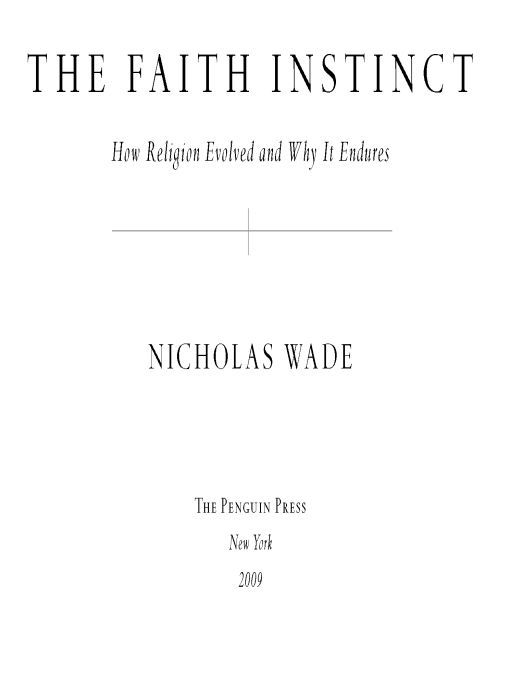
The Faith Instinct
How Religion Evolved and Why It Endures
کتاب های مرتبط
- اطلاعات
- نقد و بررسی
- دیدگاه کاربران
نقد و بررسی

October 12, 2009
Taking up where he left off in Before the Dawn
(2006), an engaging examination of human evolution in light of explorations in the human genome, longtime New York Times
science reporter Wade deftly explores the evolutionary basis of religion. He draws on archeology, social science and natural science as he vigorously shows that the instinct for religious behavior is an evolved part of human nature because, like other human social traits that have evolved over many thousands of years, the practice of religion conferred a decided survival advantage to those who practiced it. Natural selection operates according to principles of survival and reproduction of offspring with heritable traits. Many of the social aspects of religious behavior offer advantages—such as internal cohesion—that lead to a society’s members having more surviving children. More importantly, since religions have evolved as their societies have developed, is it possible, Wade asks, for religions to be reworked so that as many people as possible can exercise their innate religious instincts to their own and society’s benefits? Sure to be controversial for its reduction of religion to a product of natural selection, Wade’s study compels us to reconsider the role of evolution in shaping even our most sacred human creations.

November 15, 2009
A provocative account of the development of religion.
People have been practicing religion for thousands of years, but they have been practicing morality even longer. In this probing work of science reporting, New York Times correspondent Wade (Before the Dawn: Recovering the Lost History of Our Ancestors, 2006, etc.) sheds light on what is sure to be a controversial new field of research in evolutionary psychology, genetics and anthropology. The author asserts that morality and religion are in fact products of evolution. Belief in a higher power and belief in doing unto others as you would have done unto you served important functions in humankind's development—providing social order and cohesion in the absence of law and government. The more order within early hunter-gatherer societies, the more likely the chance of survival and procreation. In simple, straightforward prose, Wade takes the reader on a tour of intellectual history, digressing occasionally to discuss new research into the hard-wired nature of religion—comparing it to language and the power of empathy—and to address such figures as Steven Pinker, Richard Dawkins and others who have launched and influenced the so-called new atheism movement. After matter-of-factly presenting their stances, Wade writes that each seems"driven less by any particular evidence than by an implicit premise that religion is bad, and therefore must be nonadaptive." Such is the attitude and even-keeled tone even the most skeptical readers— believers and materialists alike—can expect from this highly intriguing new book.
A turning point, and advancement, in the science-religion debate.
(COPYRIGHT (2009) KIRKUS REVIEWS/NIELSEN BUSINESS MEDIA, INC. ALL RIGHTS RESERVED.)

November 1, 2009
Science reporter Wade ("New York Times") has written an intriguing case for religion and belief in "God" being wired into our human genetics, rather than being something that is learned. He asserts that we are born with a natural tendency to believe in a higher power or a system of religion much like our natural aptitude to learn a language. Religion provided early societies with the structures necessary to organize governments and systems of law. Wade chronicles the development of religious practices through the ages and shows how religion builds community, along with loyalties, and causes differences from place to place that are responsible for many conflicts and wars. Gathering input from numerous experts in their fields, he collects data to support the scientific and behavioral basis for religious thought being part of our physical and mental selves. Similar books that study this topic are Karen Armstrong's "The Case for God" and Lee Strobel's "The Case for the Creator". VERDICT This book will be enjoyed by readers interested in cross-disciplinary studies among science, anthropology, and theology, presented accessibly. Both students and general readers may be interested.Cynde Suite, Bartow Cty. P.L. Syst., Cartersville, GA
Copyright 2009 Library Journal, LLC Used with permission.

November 15, 2009
Evolutionary studies have accumulated enough convincing explanations based on enough factual discovery for it to be indisputable that religion is biologically rooted. Wade, a science journalist whose vita includes stints with the revered journals Nature and Science before he joined the New York Times science section, draws on the most famous and influential researchers to synthesize the story of religion through the ages. While religion has utility for the individual, it is overwhelmingly important for group cohesion and loyalty, as evidenced by the mass dancing, chanting, and trance-seeking of hunter-gatherer cultures, in which what much later Christian idealists called the priesthood of all believers genuinely obtained. When stationary communities arose, hierarchies followed in all enterprises, including religion, and if anything, religions community-binding function became more crucial as populations and then technology burgeoned. By now, it should be obvious that religion not only wont but cant be expunged. There is so much more in this compact account, including cultural-evolutionary explanations of the three great monotheismsenough, in fact, to make it a cornerstone of popular religion-and-science studies.(Reprinted with permission of Booklist, copyright 2009, American Library Association.)

























دیدگاه کاربران